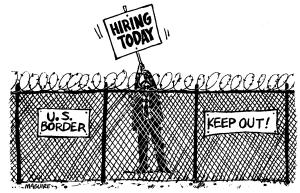|
Issue Date: September 12, 2003
By MIA CROSTHWAITE How could the church even think of advocating for legal rights for illegal aliens? They’re criminals!” a man said to me last winter just before the legislative session where I would represent the Idaho Catholic church. And then another said the same thing, then another. These were good people, not people I would describe as racist, but here were these xenophobic words coming out of their mouths. When people here in Idaho have such strong reactions to immigrants, they are usually thinking exclusively of Mexicans. In the small town where I grew up, I regularly heard the word “Mexican” used like a cuss word. The racism toward Hispanics was blatant and ugly. Unfortunately, I don’t think things have changed much. The assumption that violating immigration law makes people criminals places immigration violations in the same category as burglary, assault, rape and murder. A better understanding sees them as administrative transgressions, such as failing to renew your license plate or register for Selective Service. Americans hold up the values of generosity, respect and compassion. So there is something terribly out of sync between the generosity we believe is right and the validation we feel for unjust treatment of immigrants. Rather than seeing Mexicans as our sisters and brothers, Mexicans are “those people,” the ones who breach our law by their mere presence. These attitudes reveal some very telling opinions of Americans. First is the opinion that the Constitution and U.S. law are divinely given guides on right and wrong. Isn’t that the boundary of American discourse? Our religious views are “just opinions,” but the Constitution is an unquestioned authority. Second is the very individualistic way Americans think. We only see the immigrant as they impact us. Third is that our national ownership of this land is absolute. Our law says who can enter and who can’t. In contrast is the imagery of Genesis where God gave the whole world, a world without boundaries, to the totality of the human community. Last is the latent sister of racism: xenophobia. Fear and contempt for foreigners has only increased since Sept. 11. The primary argument against undocumented immigration today is national security -- forget that none of the terrorists was undocumented. Our parishes remain divided between the English-speakers and the Spanish-speakers. In the one place where people should be able to come together as sisters and brothers, there is little unity. We fail to welcome Mexican immigrants as our brothers and sisters in Christ due to our own insecurity and vulnerability. And frankly after suffering discrimination all week, many Mexican immigrants don’t want to worship with their oppressors. In January, the U.S. and Mexican bishops issued a joint pastoral letter, “Strangers No Longer: Together on the Journey of Hope.” They said that “migration between our two nations is necessary and beneficial.” The reality is that the population of Mexican immigrants in the United States is increasing, doubling between 1994 and 2000 to 8 million. “Alarmingly, migrants often are treated as criminals by civil enforcement authorities. Misperceptions and xenophobic and racist attitudes in both the United States and Mexico contribute to an atmosphere in which undocumented persons are discriminated against and abused.” The fundamental issue, of course, is the conditions in Mexico that drive people to migrate. If we see Mexicans as our own people, members of our community, then we well up in righteous anger at the poverty and injustice that exist in our land to the south. The bishops said, “We speak to the migrants who are forced to leave their lands to provide for their families or to escape persecution. We stand in solidarity with you.” The U.S. economy is heavily dependent on the labor provided by undocumented immigrants. It has been suggested that if every undocumented worker went home tomorrow, the U.S. agricultural industry would collapse. “Despite the rhetoric from anti-immigrant groups and some government officials, they labor with the quiet acquiescence of both government and industry,” the bishops noted. We can rightly be counted among the hypocrites when we criminalize those who immigrate while remaining dependent on their labor. During the Idaho legislative session, a local sheriff said that when he reports undocumented people, action is almost never taken. Our regulations say “no, no” but the hands behind our back say “yes, yes.” The U.S. bishops took a bold stand when they called for the wholesale legalization of undocumented immigrants currently residing in the United States. The risk of exploitation, which is virtually a guaranteed eventuality, is such a significant transgression that it demands a significant response. We are called to pastorally and lovingly respond to the immigrant we find in our midst. In the end, we will be judged by how we treated the least of these. Did we welcome them? Did we clothe, feed and give drink to them? All around us is Jesus in the beautiful disguise of the Mexican illegal alien. Mia Crosthwaite resides in Boise, Idaho. She serves as legislative liaison for the diocese of Boise and Catholic Charities of Idaho and coordinator of adult Catholic education of the Treasure Valley, a coalition of parishes in and around Boise, Idaho. National Catholic Reporter, September 12, 2003 |
 Jesus in the disguise of an illegal alien
Jesus in the disguise of an illegal alien